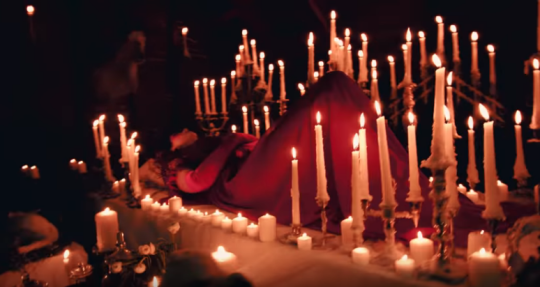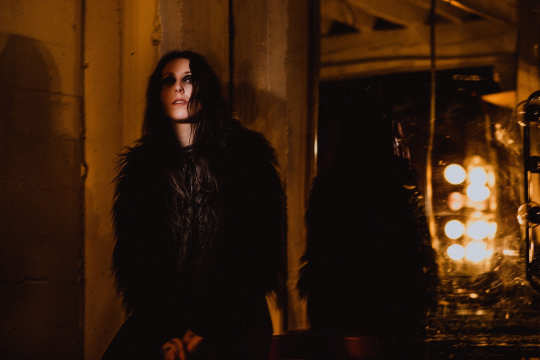Feature via DICE
Your new video for The Culling is inspired by Baz Lurhmann’s Romeo + Juliet — what does the film mean to you?
“I was always a fan of the story of Romeo and Juliet, but the way Baz Lurhmann presented it in this film woke something up in me as a young person. Honestly, bits of the film have influenced most of my music videos and photos over the years. Even the language.. the way Shakespearean English was brought into the modern world and mixed with pop culture — I think that kind of style creeps into my lyrics a lot.”

The Culling
What about the visuals and aesthetic connected with you?
“The costume design and set design really catered to the different sides I’m drawn to: this gothic darkness, the colourful Catholic flamboyance, and a soft, minimal innocence — Tybalt’s all-black outfit with the bright red vest hiding underneath and those amazing boots, and then Juliet in her white dresses. Overall, the set design in the Capulet crypt is something to be celebrated! A lot of people wouldn’t expect me to be drawn to colourful settings, but I really am, and I think this film was the catalyst for that.
How easy was it to recreate these visuals in The Culling video? That’s a lot of candles — did you have someone on fire safety duty?!
“It’s not so much that we were recreating it, but that final scene in Romeo + Juliet has always stuck with me with all the candles and the neon crosses in the crypt. The photo of Juliet laying asleep on the altar was my initial inspiration; something I gave to Bill Crisafi (along with a photo of the strange feast with the monster in Pan’s Labyrinth) to help guide his set design for the video — I can’t take credit for that part — Bill is amazing! We did make sure to have a fire extinguisher close by, and I asked the costume designer Ashley Rose to keep a special eye out in case something caught fire. Strangely, once we were rolling, I was able to just focus on the mood of the song and forget about the multitude of tiny flames surrounding me.”
Any favourite scenes in the movie?
“When Tybalt puts the cigarette out with his boot and says ‘Peace, I hate the word…’ and the fight scene that ensues — I love when a film is highly stylised, I just want to get lost in its world. I loved the priest tending to and explaining his plants, also, Romeo walking towards the altar on the path lined with neon crosses, and Juliet’s cry at the end when she realises Romeo is gone — I get tears in my eyes just thinking about it! Any scene with Mercutio is the best, and also Juliet and Romeo bein’ cute in the white sheets in the morning is so sweet.”
Do you remember the first time you saw the film?
“Actually my 13th birthday party was going to see this film with my friends! I remember seeing the trailer and just knowing I was going to be into it. After the birthday party viewing, I was speechless! I went to see it many more times after that and still watch it every now and then. It was one of my first strong aesthetic influences, along with Ingmar Bergman’s the Seventh Seal and John Waters’ Cry-Baby.”
Does the soundtrack from the film play an important part in your musical history?
“Definitely. Along with the film, the soundtrack had a big impact on me. I listened to it over and over. The Garbage song on there, “#1 Crush,” was a favourite (still is) and I’m sure it has influenced my own music.
Which song on the soundtrack means the most to you?
“That Radiohead song Talk Show Host. It plays when you’re first introduced to Romeo in the film. He’s off on the beach, writing in his journal and smoking cigarettes — I related to that mood so much as a 13 year old! I just wanted to be away from people, writing poetry and being myself, but I felt so much pressure to fit into societal norms. That push-and-pull made junior high and high school a living hell for me, and the Romeo + Juliet soundtrack got me through much of it.
“As I was writing Hiss Spun, I was in-between houses and had to stay with family for some months. Not having any personal space felt a bit like those teenage years and I was reminded of music as escapism. I spent a lot of time in headphones writing songs and finding that feeling of freedom in music again.”

